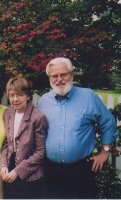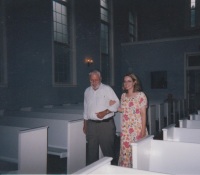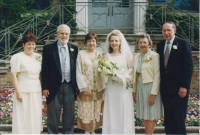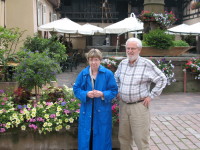 Here is the last of the three eulogies given at Dale’s funeral. This one was given by his last boss, the headmaster of Geneva School in Florida, Bob Ingram.
Here is the last of the three eulogies given at Dale’s funeral. This one was given by his last boss, the headmaster of Geneva School in Florida, Bob Ingram.
Dale King made me a better man.
At St. Paul’s, I was Dale’s pastor, and he was a trusted elder who served and loved his fellow congregants well. His ministry was the care of souls; he delighted in rapt attention to the preached Word; he had a love of liturgy for its spiritual language; and he had the humility to sit under the teaching of men his junior.
Those of his own age and era found the cadence of his speaking, the rhythm of his words, and the poetics of his vocabulary to be friendly reminders of times past. Those younger than Dale found him admirable and came to understand what is meant by the phrase “requiem for a lost piety.” They knew his love of Jesus differed from theirs—it was richly deeper, more intimate, and that they were the poorer for their lack of reverence and devotional prayer.
As an elder at St. Paul’s Dale was wise, faithful, optimistic, a man of good cheer, theological astuteness, and never at a loss for many “not so whispered” quips during our deliberations. One left session meetings, as with any discussion with him, realizing he was a treasure trove of spiritual insight distilled in the literature of Christian authors of the English speaking world.
As an erstwhile poet who maintained he wrote “but doggerel on his best days,” I encouraged him to write hymns and spiritual lyrics for use in the church and The Geneva School. 18 years later, and as recently as Sunday in church, we continue to render praise in the words he penned. Current and future generations will frame their understanding of the Christian faith through his eyes, his metaphors, and his rhyme.
 Dale was “old school,” which suited us all just fine. Being a Christian classical school we resonated with each other; our hearts beat in synch and especially for the humanities. Dale loved to teach and his students, being enamored of him and revering him so, loved to learn. Teaching did not tire him—if anything it energized him to fulfill his calling with all diligence. He had a warm affection for his students, and they knew that when he interrupted himself, raised his eyebrows, raised a pointed finger, that he was now going “off topic.” A foray into his own foibles, Irish poetry, George Herbert or Shakespeare would amaze them regarding his fertility of mind and imagination and wit, all given over to the pursuit of biblical faith.
Dale was “old school,” which suited us all just fine. Being a Christian classical school we resonated with each other; our hearts beat in synch and especially for the humanities. Dale loved to teach and his students, being enamored of him and revering him so, loved to learn. Teaching did not tire him—if anything it energized him to fulfill his calling with all diligence. He had a warm affection for his students, and they knew that when he interrupted himself, raised his eyebrows, raised a pointed finger, that he was now going “off topic.” A foray into his own foibles, Irish poetry, George Herbert or Shakespeare would amaze them regarding his fertility of mind and imagination and wit, all given over to the pursuit of biblical faith.
His presence on our faculty legitimated all other faculty members. He gentled all of our conditions by his demeanor and cultivated aesthetic: Now, admittedly, he did not do this through his playfully irreverent quips—
“I’m here to fetch my woman.”
“Hey Bossman”
“This has been a grand gig to teach at Geneva”
Nor by his worn, stretched T-shirts, always untucked, and sagging shorts and sandals.
But his aesthetic contribution was in the beauty of a life well lived; in the fidelity of his love for Carlene and his unselfish devotion to her; his life flourished with fruit from his love of the arts, opera, literature, the theater, music, George Herbert, Bach cantatas, and the beauty of language that extolled a beautiful Savior.
 He was a man of letters whose every correspondence I have kept on file, for each is worthy of a second reading. I was always astounded and humbled that he considered me his theological and grammar editor of all of his circular letters at Christmas, Easter, and celebrative occasions. He even sought my counsel on some rhyming schemes for a love poem he wrote for Carlene. In reflection I believe he did it not for any MODEST assistance rendered, but as a “nuanced nudge” that maybe I should endear myself to my wife even as he did to Carlene.
He was a man of letters whose every correspondence I have kept on file, for each is worthy of a second reading. I was always astounded and humbled that he considered me his theological and grammar editor of all of his circular letters at Christmas, Easter, and celebrative occasions. He even sought my counsel on some rhyming schemes for a love poem he wrote for Carlene. In reflection I believe he did it not for any MODEST assistance rendered, but as a “nuanced nudge” that maybe I should endear myself to my wife even as he did to Carlene.
Dale King made me a better man, pastor, and Headmaster.
Mary commented that the years in Orlando may have been some of their happiest. Should that be the case, please know that Dale and Carlene were well loved, and always had ample affection for both St. Paul’s and Geneva.
Allow me to read to you a prayer I penned for both Dale and Carlene that was offered on their behalf the last Sunday they worshipped at St. Paul’s prior to moving back to Ohio:
O God, the sovereign disposer of the course of our lives, we pray to you this day with thankful hearts for the years that you lent the Kings to us. They have gentled all of our conditions; they have inspired us through literature with their wit, wisdom, and eloquence, the effect of which has enriched our souls. Do not permit us to squander the investment they have made in each of us; instead, O God, enlarge their legacy as the years pass by. You have seen fit to grant them over 100 years of teaching together, and they have delighted in fulfilling their calling with dignity and grace. Theirs has been a ministry to the Kingdom through the church and schools; may they who have worn a servant’s livery now receive from the kind ministrations of others.
 Give them we ask, health and vigor and length of days—the enjoyment of life with their family in Ohio. May this next time of life be a comforting one in their Pilgrim’s Progress. By your good pleasure may they continue to grow in grace as they grow in age; use this as a sanctifying grace to the advantage of all who know and love them.
Give them we ask, health and vigor and length of days—the enjoyment of life with their family in Ohio. May this next time of life be a comforting one in their Pilgrim’s Progress. By your good pleasure may they continue to grow in grace as they grow in age; use this as a sanctifying grace to the advantage of all who know and love them.
And O Father, given our low cultural estate, we would be remiss if we did not thank you for the fidelity of their marriage vows, the constancy of their love, and their mutual dependence upon one another. Preserve their sweet affection for each other in the years ahead. Continue, O God, your generous grace to them.
Through Christ our Lord, Amen.
And because it is so fitting for George Herbert to continue his poetic voice even in death, to death, this poem is offered in honor of Dale.
Death by George Herbert
Death, thou wast once an uncouth hideous thing,
Nothing but bones,
The sad effect of sadder groans:
They mouth was open, but thou couldst not sing.
For we considered thee as at some six
Or ten years hence,
After the loss of life and sense,
Flesh being turned to dust, and bones to sticks.
We looked on this side of thee, shooting short;
Where we did find
The shells of fledge souls left behind,
Dry dust, which sheds no tears, but may extort.
But since our Savior’s death did put some blood
Into they face,
Thou art grown fair and full of grace,
Much in request, much sought for as a good.
For we do now behold thee gay and glad,
As at Doomsday;
When souls shall wear their new array,
And all thy bones with beauty shall be clad.
Therefore we can go die as sleep, and trust
Half that we have
Unto an honest faithful grave;
Making our pillows either down, or dust.